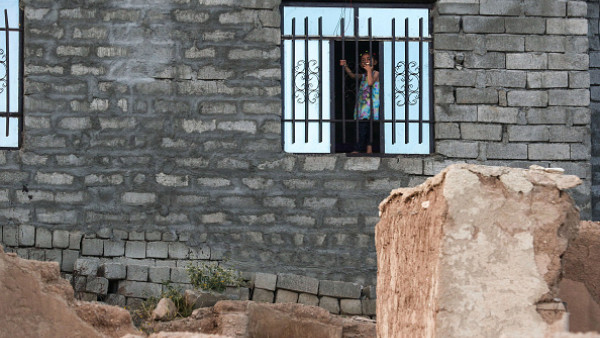An Iraqi Yazidi girl stands at a window in a house built in front of a building destroyed during the 2014 attack by Islamic State (IS) fighters and the battles that followed, in the village of Solagh in the Sinjar region [Getty]
A Yazidi woman has been rescued by Iraqi authorities ten years after IS militants took her into captivity from the Iraqi city of Sinjar during the group’s brutal invasion in 2014.
According to Kurdish broadcaster Rudaw, Yazidi rescue office head Hussain Qaidi, who is also associated with the Kurdistan Region Presidency, confirmed that Yazidi woman Tawaf Dawoud Chato was rescued on Tuesday.
Qaidi told Rudaw that Chato “arrived in Iraq from Western Kurdistan” and added that Iraqi security forces will keep her in custody until she returns to Sinjar, northern Iraq.
The New Arab’s Arabic-language sister site Al Araby Al-Jadeed reported that a security official said Chato was kidnapped as a young girl 10 years prior by IS militants.
The source said that after IS lost control of its territories, she was transferred to Al-Hawl camp along with other families and did not know details of her family except that they hailed from the village of Tal Aziz in Sinjar.
However, after further investigation, Chato was found by authorities and will be reunited with her family who had believed her to be dead.
According to the Yazidi rescue office, 3,576 of the abducted Yazidis have since been rescued so far.
Rudaw also reported that another Yazidi woman, Kovan Ido, was rescued in March after being abducted by IS.
According to the broadcaster, Ido was only aged 14 when she was taken into IS captivity from her village in the Sinjar district amid the extremist group’s offensive.
The militants seized Mosul on 10 June, 2014 and the group’s then leader, Abu Bakr al-Baghdadi, soon made his first public appearance in the city’s Great Mosque of al-Nuri.
IS killed thousands, upended countless more lives and left deep scars among the survivors.
Under their self-declared “caliphate” stretching across swathes of Syria and Iraq, they committed beheadings, torture and enslavement, turning life into living hell and leaving behind mass graves.
The extremist group also killed thousands of Yazidis, enslaved 7,000 Yazidi women and girls, and forced most of the 550,000-strong community to flee their ancestral homeland in northern Iraq.
The Yazidis, an ancient religious minority in eastern Syria and northwest Iraq, were targeted by IS due to their faith, which combines elements of Zoroastrianism, Judaism, Manichaeism, Christianity, and Islam.


